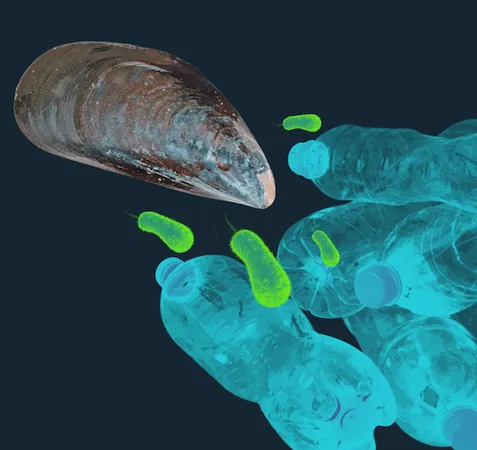
Scientists Unleash Mussel Magic: Bioengineered Microorganisms Take on Plastic Waste and Biofouling!
2024-10-07
Author: Rajesh
In a groundbreaking discovery, researchers at Rice University have harnessed the incredible adhesive power of mussels to engineer microorganisms with extraordinary sticky capabilities, paving the way for a revolutionary approach to environmental cleanup. Their innovative creation combines enhanced sticking forces with enzymes specifically designed to break down harmful plastics, offering a promising new weapon in the fight against plastic pollution.
According to the Environmental Protection Agency, the United States generates a staggering 40 million tons of plastic waste each year, with polyethylene terephthalate (PET) making up 64% of this daunting figure. PET, commonly used in packaging, is infamous for its durability and resistance to decomposition, often lingering in the environment for centuries. The Rice research team's bioengineered sticky bacteria and proteins could change that, paving the way for more efficient plastic waste decomposition worldwide.
“Very excitingly, our research holds promise for addressing the growing problem of plastic pollution in the U.S. and across the globe,” stated Han Xiao, the study's lead researcher and a director of Rice's Synthesis X Center. His dual expertise in chemistry and bioengineering positions him at the forefront of this innovative frontier.
Revolutionizing Plastic Pollution Solutions
Utilizing advanced genetic engineering techniques, the team infused the bacteria with 3,4-dihydroxyphenylalanine (DOPA), the natural amino acid that gives mussels their adhesive qualities. They dramatically enhanced the bacteria's ability to adhere to PET surfaces, achieving a jaw-dropping 400-fold increase in adhesion during lab tests conducted at a temperature of 37 degrees Celsius.
By pairing these modified bacteria with polyethylene terephthalate hydrolase—an enzyme that digests PET—the researchers observed significant degradation of plastic materials overnight, marking a potentially revolutionary shift in how we tackle plastic waste and its environmental ramifications.
“Our approach highlights the transformative power of genetic code expansion in cellular and material engineering,” Xiao said. “The implications of this research extend far beyond the lab and could solve many pressing real-world challenges.”
Combatting Biofouling: A Double Victory
Beyond plastic recycling, this research also presents a powerful strategy against biofouling, the nuisance of unwanted microbial growth that clings to underwater surfaces, leading to damage and additional costs in sectors like shipping and construction. The research team discovered that the DOPA-modified proteins demonstrated incredible adhesion to both biological and metallic surfaces, forming a protective barrier that effectively prevents damaging accumulations.
This finding opens up vast potential applications across multiple fields, including healthcare. For instance, it could lead to advancements in medical devices by preventing bacterial growth, ultimately ensuring safer and more effective healthcare solutions.
“This research proposes new pathways for creating intelligent material-protein conjugates that can be implemented in various biomedical applications, from implantable devices to innovative drug delivery systems,” explained Mengxi Zhang, the study’s first author and a graduate student in chemistry.
As the battle against plastic pollution intensifies globally, the innovations stemming from Rice University's research may very well become a linchpin in creating a cleaner, more sustainable planet. The world watches on eagerly as these remarkable developments unfold, hoping for a future where plastic waste is a relic of the past.

 Brasil (PT)
Brasil (PT)
 Canada (EN)
Canada (EN)
 Chile (ES)
Chile (ES)
 España (ES)
España (ES)
 France (FR)
France (FR)
 Hong Kong (EN)
Hong Kong (EN)
 Italia (IT)
Italia (IT)
 日本 (JA)
日本 (JA)
 Magyarország (HU)
Magyarország (HU)
 Norge (NO)
Norge (NO)
 Polska (PL)
Polska (PL)
 Schweiz (DE)
Schweiz (DE)
 Singapore (EN)
Singapore (EN)
 Sverige (SV)
Sverige (SV)
 Suomi (FI)
Suomi (FI)
 Türkiye (TR)
Türkiye (TR)